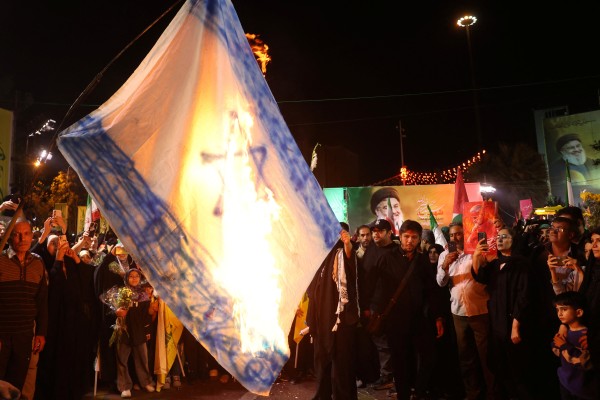Israel and the United States warned of a sharp response after Iran fired a salvo of missiles at Israel Tuesday, in retaliation for Israel’s campaign against Tehran’s Hezbollah allies in Lebanon.
Israel said more than 180 missiles were launched into Israel from Iran and Israeli air defences were activated to intercept them. U.S. Navy warships fired about a dozen interceptors against Iranian missiles headed toward Israel, the Pentagon said.
RAW FOOTAGE: Watch as Iranian missiles rain over the Old City in Jerusalem, a holy site for Muslims, Christians and Jews.
This is the target of the Iranian regime: everyone. pic.twitter.com/rIqUZWN3zy
— Israel Defense Forces (@IDF) October 1, 2024
No injuries were reported in Israel, but one man was killed in the occupied West Bank, authorities there said.
Iran’s Revolutionary Guard Corps said the assault was in retaliation for recent Israeli killings of militant leaders and aggression in Lebanon and Gaza. Its forces used hypersonic Fattah missiles for the first time, and 90% of its missiles successfully hit their targets in Israel, the Revolutionary Guards said.
“We will choose when to collect the price, and prove our precise and surprising attack capabilities, in accordance with the guidance of the political leadership,” said Israeli Major General Herzi Halevi.
Washington backed up its longtime ally. “We have made clear that there will be consequences, severe consequences, for this attack, and we will work with Israel to make that the case,” spokesman Jake Sullivan said at a White House briefing.
Sullivan did not specify what those consequences might be, but he stopped short of urging restraint by Israel as the U.S. did in April when Iran carried out a drone and missile attack on Israel.
Israeli Prime Minister Benjamin Netanyahu and a few other ministers were meeting in a bunker near Jerusalem, where the security cabinet was due to convene shortly, two Israeli officials said.
Iran said if Israel retaliated Tehran’s response would be “more crushing and ruinous”. Tehran targeted three Israeli military bases in its attack, Iran’s state news agency said.
“This is just part of our capability. Do not get into a confrontation with Iran,” warned Iranian President Masoud Pezeshkian in a social media post.
A senior Iranian official told Reuters the order to launch missiles at Israel had been made by the country’s Supreme Leader Ayatollah Ali Khamenei, who remains in a secure location.
Oil prices shot up 5% on the news of the Iranian missile strikes, which raise the prospect of a wider war between the two arch enemies.
The previous round of Iranian missiles fired at Israel in April – the first ever – were shot down with the help of the U.S. military and other allies. Israel responded at the time with airstrikes in Iran, but wider escalation was averted.
The Pentagon said the scope of Tuesday’s airstrikes was about twice the size of April’s assault.
Hamas, the Iran-backed militant group in Gaza, praised the Iranian missile strikes, saying they avenged Israeli assassinations of three militant leaders, including Nasrallah.
Palestinian Arabs in Samaria (the “West Bank”) are celebrating the Iranian attack on Israel.pic.twitter.com/r58VHs0Sy6
— Marina Medvin 🇺🇸 (@MarinaMedvin) October 1, 2024
In Washington, U.S. President Joe Biden said the United States was prepared to help Israel defend itself from Iranian missile attacks, and Sullivan said the president was tracking developments “minute by minute.”
U.N. Secretary-General Antonio Guterres condemned what he called “escalation after escalation”, saying: “This must stop. We absolutely need a ceasefire.”
Israel in a post on X criticised Guterres for not holding “Iran responsible for firing 181 ballistic missiles at 10 million Israeli civilians.”
Israel said overnight that its troops had launched ground raids into Lebanon, though it described the forays as limited.
In Beirut, Israeli strikes killed the commander of the Imam Hussein division, Israel’s military said, referring to a Hezbollah-linked group based in Syria.
Nearly 1,900 people have been killed and more than 9,000 wounded in Lebanon in nearly a year of cross-border fighting, most in the past two weeks, according to Lebanese government statistics on Tuesday.
But a ground campaign into Lebanon for the first time in 18 years pitting Israeli soldiers against Hezbollah, Iran’s best-armed proxy force in the Middle East, would be a major regional escalation.
(REUTERS)
In a career spanning three decades and counting, Ramananda (Ram to his friends) has been the foreign editor of The Telegraph, Outlook Magazine and the New Indian Express. He helped set up rediff.com’s editorial operations in San Jose and New York, helmed sify.com, and was the founder editor of India.com.
His work has featured in national and international publications like the Al Jazeera Centre for Studies, Global Times and Ashahi Shimbun. But his one constant over all these years, he says, has been the attempt to understand rising India’s place in the world.
He can rustle up a mean salad, his oil-less pepper chicken is to die for, and all it takes is some beer and rhythm and blues to rock his soul.
Talk to him about foreign and strategic affairs, media, South Asia, China, and of course India.





